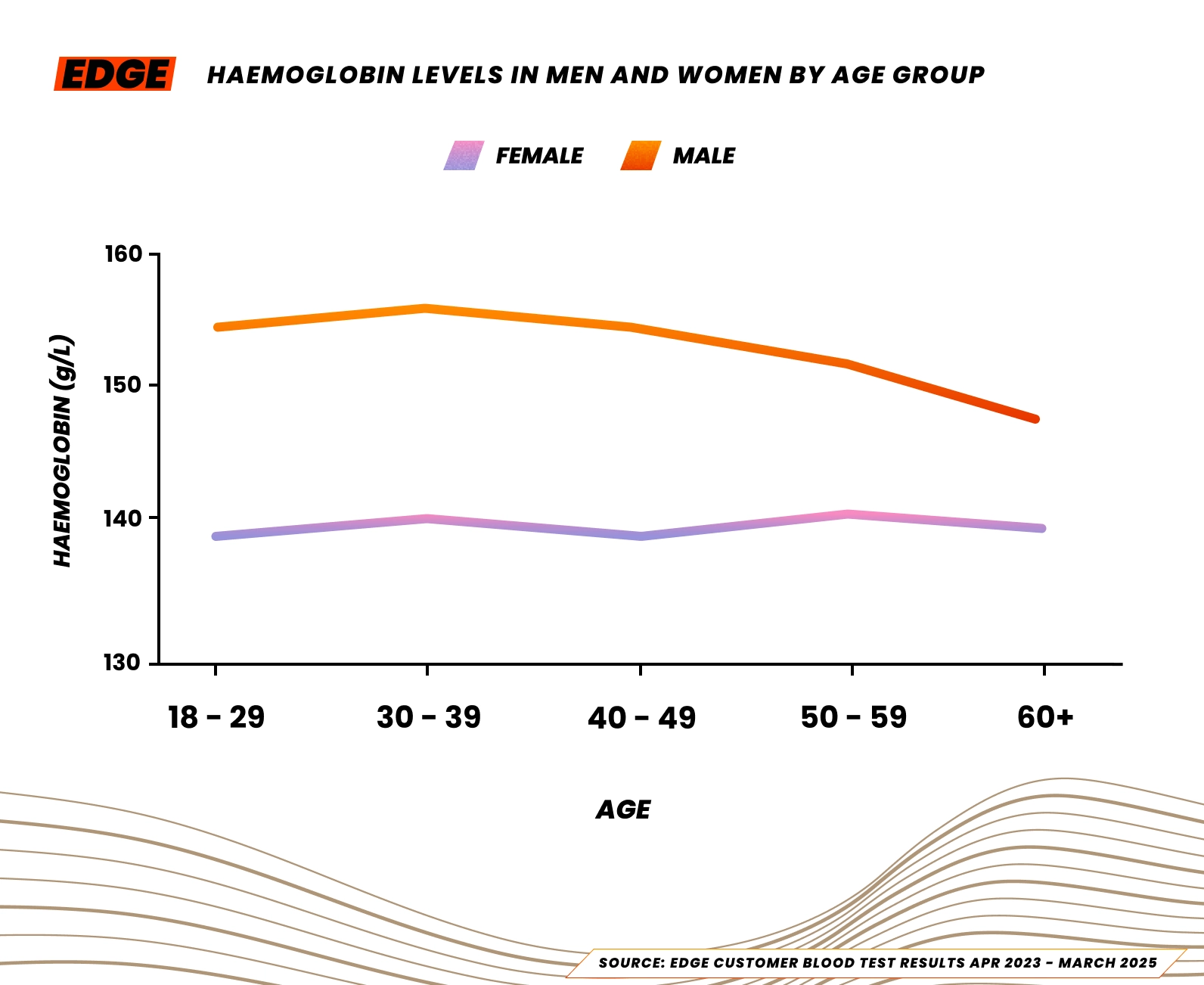What is Haemoglobin & why is it important for athletes?
1 min read
Published on
May 22, 2025
Written by
EDGE
Share this article
What Is Haemoglobin?
Haemoglobin is the protein in red blood cells responsible for carrying oxygen from your lungs to your muscles. For athletes, it’s one of the most important markers of aerobic capacity, endurance, and recovery.
If your haemoglobin is low, your muscles receive less oxygen, leading to early fatigue, reduced performance, and slower recovery. Optimising haemoglobin levels is essential for sustained, high-output training and competition.

"Haemoglobin carries oxygen to working muscles, making it a core marker of athletic capacity. Low levels reduce aerobic performance, while unusually high levels may indicate overtraining or altitude adaptation. I recommend testing every 3–6 months, and combining with ferritin and red blood cell count to fully assess oxygen transport and red cell health."
Why Oxygen Matters in Sport
-
Endurance & VO₂ Max
Haemoglobin is directly tied to your aerobic ceiling. Low levels mean your body can’t deliver oxygen efficiently during sustained exercise — whether running, cycling, or swimming.
-
Recovery & Energy
Oxygen is needed not just for performance, but for muscle repair and post-exercise recovery. Low haemoglobin can increase perceived effort and prolong fatigue.
-
Altitude & Anaemia Risks
Athletes training at altitude or at high intensity over long periods may be at greater risk of iron deficiency anaemia, a condition that lowers haemoglobin and severely limits performance.
What are normal Haemoglobin levels for athletes?
We looked at blood test data from EDGE customers and found the median haemoglobin levels for women are 139 g/L and 153 g/L for men.
Here is a breakdown of haemoglobin levels by age:
| Table 1: Haemoglobin Levels in Men and Women by Age Group (g/L) | ||
| Age Group | Female | Male |
| 18-29 | 138 | 154 |
| 30-39 | 140 | 155 |
| 40-49 | 138 | 154 |
| 50-59 | 140.5 | 151.5 |
| 60+ | 139.5 | 147 |
Source: EDGE customer blood test results Apr 2023 – March 2025.
The labs we used to analyse blood samples state a healthy range for haemoglobin is generally between 120-160 g/L for women and 130-180 g/L for men.

Symptoms of Low Haemoglobin
-
Fatigue or heaviness during workouts
-
Shortness of breath
-
Reduced endurance
-
Dizziness or light-headedness
-
Pale complexion or cold hands/feet
These symptoms may appear gradually but can have a significant impact on performance if left unchecked.
Symptoms of High Haemoglobin
-
Frequent headaches during or after training
-
Blurred vision, particularly under physical strain
-
Dizziness or light-headedness, especially post-exercise
-
Elevated blood pressure readings
-
A persistently flushed or reddened complexion
High haemoglobin levels can sometimes occur naturally with intense training or as a side effect of therapies like TRT. Left unchecked, it may increase the risk of blood thickening, reduced cardiovascular efficiency, and performance decline.
Why Test Haemoglobin?
-
To screen for iron-deficiency anaemia or under-recovery
-
To monitor the effects of high-altitude training
-
To track changes alongside ferritin, vitamin B12, and folate
-
When fatigue, breathlessness, or performance decline occurs
-
As part of routine endurance performance testing
Haemoglobin testing is particularly useful for female athletes, endurance competitors, and those on restricted or plant-based diets.
How to Support Healthy Haemoglobin Levels
-
Prioritise iron-rich foods: red meat, poultry, legumes, leafy greens
-
Pair iron sources with vitamin C to improve absorption
-
Avoid tea/coffee with meals, which can inhibit iron uptake
-
Consider iron supplementation only if deficiency is confirmed through testing
-
Monitor related markers like ferritin, B12, and folate
In Summary
-
Haemoglobin carries oxygen to working muscles, critical for performance
-
Low levels reduce endurance, increase fatigue, and limit recovery
-
Test regularly if you're an endurance athlete, menstruating, or at altitude
-
Works best when monitored with ferritin and full blood count markers
Check Your Haemoglobin Levels
Check and monitor your haemoglobin levels from home with our sports blood tests.
Get 10% off your first order
Want regular tips on how to make the most of your results? Join our newsletter and we'll give you 10% off your order!
Get the knowledge
Get expert advice to help you improve your results.
Go to our knowledge center


